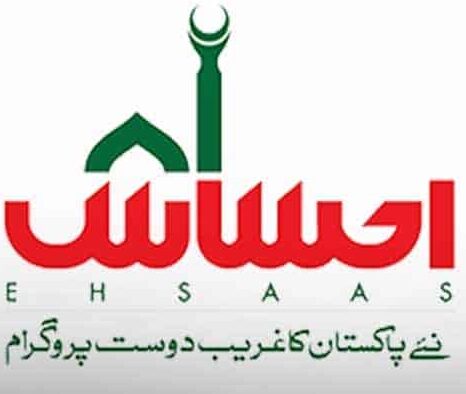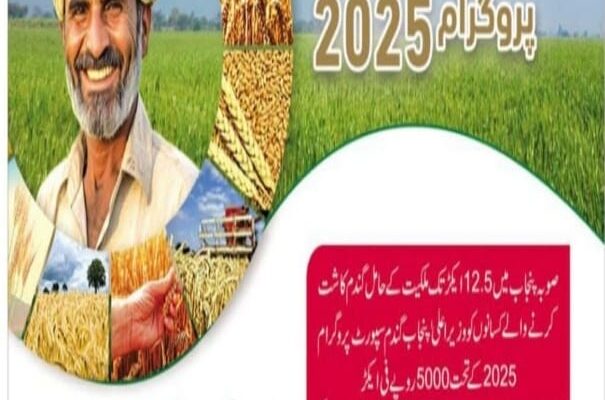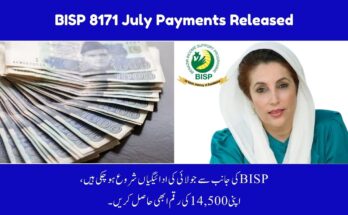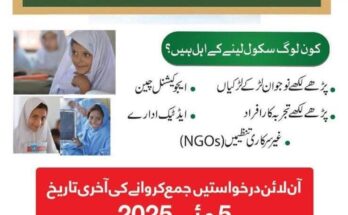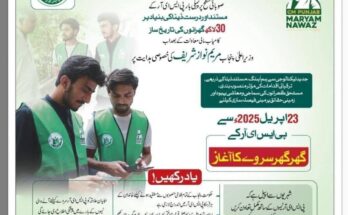Introduction
Gandum Support Program 2025: Wheat, known as “gandum” in many regions, is a cornerstone of global food security, serving as a staple crop for millions of people worldwide. In Pakistan, wheat is not just a crop but a lifeline for farmers, rural economies, and the nation’s food supply. Recognizing its critical importance, the Government of Pakistan has introduced the Gandum Support Program 2025, a comprehensive initiative aimed at bolstering wheat production, supporting farmers, and ensuring food security in the face of economic, environmental, and climatic challenges. This article delves into the objectives, components, implementation strategies, and potential impacts of the Gandum Support Program 2025, exploring how it seeks to transform the agricultural landscape for wheat farmers.
Background: The Importance of Wheat in Pakistan
Pakistan is one of the world’s top wheat-producing countries, with wheat being the most significant crop in terms of cultivated area and contribution to food security. Approximately 80% of Pakistan’s population relies on wheat-based products, such as roti and naan, as a primary source of nutrition. The crop occupies nearly 9 million hectares of agricultural land, primarily in Punjab, Sindh, and parts of Khyber Pakhtunkhwa, contributing significantly to the country’s GDP and rural livelihoods.
However, wheat farmers face numerous challenges, including fluctuating market prices, inadequate access to quality seeds, water scarcity, climate change impacts, and limited financial support. In 2024, farmers protested against low wheat prices and the government’s failure to procure wheat at promised rates, highlighting the need for a robust support system. The Gandum Support Program 2025 emerges as a response to these issues, building on lessons from previous agricultural policies and global best practices.
Objectives of the Gandum Support Program 2025
The Gandum Support Program 2025 is designed with a multi-pronged approach to address the systemic challenges faced by wheat farmers. Its primary objectives include:
- Ensuring Price Stability: To provide farmers with a guaranteed minimum support price (MSP) to protect them from market volatility and ensure fair returns on their produce.
- Enhancing Productivity: To increase wheat yields through the provision of high-quality seeds, modern farming techniques, and access to irrigation and fertilizers.
- Promoting Sustainability: To encourage climate-resilient agricultural practices that mitigate the impact of environmental challenges such as drought and soil degradation.
- Improving Access to Finance: To facilitate affordable credit and insurance schemes for small and marginal farmers to reduce financial risks.
- Strengthening Supply Chains: To streamline procurement, storage, and distribution processes to minimize post-harvest losses and ensure food security.
- Empowering Rural Communities: To support rural women, youth, and landless farmers through training, subsidies, and alternative livelihood opportunities tied to wheat production.
Key Components of the Program
The Gandum Support Program 2025 is structured around several core components, each targeting specific aspects of the wheat production ecosystem.
1. Minimum Support Price (MSP) Mechanism
The program introduces a revised MSP framework to ensure farmers receive a fair price for their wheat. For the 2025 season, the MSP has been set at PKR 4,200 per 40 kg, an increase from the PKR 3,900 announced in 2024, reflecting rising input costs and inflation. The government has committed to procuring at least 50% of the total wheat produce directly from farmers through designated procurement centers, reducing reliance on middlemen and ensuring timely payments. This initiative aims to address the grievances raised by farmers in 2024, when low market prices led to widespread protests.
2. Subsidized Inputs and Technology
To boost productivity, the program provides subsidies on high-yielding, climate-resilient wheat seeds, fertilizers, and pesticides. The government has partnered with agricultural research institutes to distribute certified seeds that can withstand drought and pests. Additionally, farmers will receive subsidized access to modern machinery, such as laser land levelers and mechanized harvesters, through rental programs. The introduction of digital tools, such as mobile apps for weather forecasting and soil health monitoring, is also a key feature, enabling farmers to make informed decisions.
3. Climate-Resilient Farming Practices
With climate change posing a significant threat to agriculture, the program emphasizes sustainable practices. Farmers are trained in water-efficient irrigation techniques, such as drip and sprinkler systems, to address water scarcity. The program also promotes conservation agriculture, including zero-tillage and crop rotation, to enhance soil health and reduce environmental degradation. Financial incentives are offered to farmers adopting organic farming and integrated pest management, aligning with global trends toward sustainable agriculture.
4. Financial Support and Insurance
Access to affordable credit remains a major hurdle for small farmers. The Gandum Support Program 2025 collaborates with the State Bank of Pakistan and microfinance institutions to provide low-interest loans tailored to wheat farmers’ needs. Additionally, the program expands the scope of the Pradhan Mantri Fasal Bima Yojana (crop insurance scheme) to cover wheat farmers against losses due to natural disasters, pests, or market fluctuations. A dedicated fund of PKR 10 billion has been allocated to support these financial interventions.
5. Capacity Building and Training
The program includes extensive training initiatives to equip farmers with modern agricultural knowledge. Agricultural extension services will conduct workshops on best practices, seed selection, and pest management. Special focus is placed on empowering women and youth in rural areas through skill development programs, such as agribusiness training and cooperative farming models. These efforts aim to create a new generation of agri-entrepreneurs who can drive innovation in the wheat sector.
6. Infrastructure and Supply Chain Development
To reduce post-harvest losses, the program invests in modern storage facilities and cold chain infrastructure. The government plans to establish 100 new wheat storage silos across major producing regions by 2025, with a capacity to store 2 million metric tons. Additionally, the program strengthens the role of the Pakistan Agricultural Storage and Services Corporation (PASSCO) in procurement and distribution, ensuring efficient supply chains and stable market prices for consumers.
Implementation Strategy
The Gandum Support Program 2025 is implemented through a collaborative framework involving federal and provincial governments, agricultural departments, research institutions, and private sector partners. Key aspects of the implementation strategy include:
- Decentralized Execution: Provincial governments are responsible for tailoring the program to local needs, ensuring flexibility in addressing region-specific challenges. For instance, Punjab, the largest wheat-producing province, will focus on mechanization, while Sindh will prioritize irrigation improvements.
- Public-Private Partnerships (PPPs): The government has partnered with private companies, such as fertilizer manufacturers and seed suppliers, to ensure timely delivery of inputs. Agrotech startups are also involved in providing digital solutions and market linkages.
- Monitoring and Evaluation: A dedicated task force, comprising agricultural experts and policymakers, will monitor the program’s progress using key performance indicators, such as yield increases, farmer incomes, and adoption of sustainable practices. Regular feedback from farmers will inform mid-course corrections.
- Community Engagement: Farmer cooperatives and village-level committees are established to ensure grassroots participation and transparency in the distribution of subsidies and benefits.
Expected Impacts
The Gandum Support Program 2025 is poised to have far-reaching impacts on Pakistan’s agricultural sector and rural economy. Some anticipated outcomes include:
- Increased Wheat Production: By providing access to quality inputs and modern techniques, the program aims to increase wheat yields by 15% over the next three years, contributing to national food security.
- Improved Farmer Incomes: The MSP mechanism and financial support are expected to boost farmer incomes by 20%, reducing ruralSyndrome (PMS). The program’s focus on empowering women and youth will also promote gender equity and youth engagement in agriculture.
- Enhanced Climate Resilience: The adoption of sustainable practices will help farmers adapt to climate change, ensuring long-term agricultural sustainability.
- Economic Growth: The program’s investments in infrastructure and supply chains will create jobs and stimulate rural economies, reducing migration to urban areas.
- Food Security and Price Stability: Efficient procurement and storage systems will ensure a stable supply of wheat, keeping prices affordable for consumers.
Challenges and Mitigation Strategies
Despite its ambitious goals, the Gandum Support Program 2025 faces potential challenges, including bureaucratic inefficiencies, funding constraints, and resistance to adopting new practices. To address these, the government has allocated PKR 50 billion in the 2025-26 budget for the program, with additional support from international partners like the World Bank and Asian Development Bank. Anti-corruption measures, such as digital payment systems for subsidies, will enhance transparency. Awareness campaigns and pilot projects will also build trust among farmers hesitant to adopt modern techniques.
Conclusion
The Gandum Support Program 2025 represents a bold step toward transforming Pakistan’s wheat sector, addressing long-standing challenges faced by farmers while aligning with global sustainability goals. By combining financial support, technological innovation, and community empowerment, the program has the potential to not only secure Pakistan’s food future but also serve as a model for agricultural development worldwide. As the program rolls out, its success will depend on effective implementation, stakeholder collaboration, and the active participation of farmers—the heart of Pakistan’s agricultural landscape.
